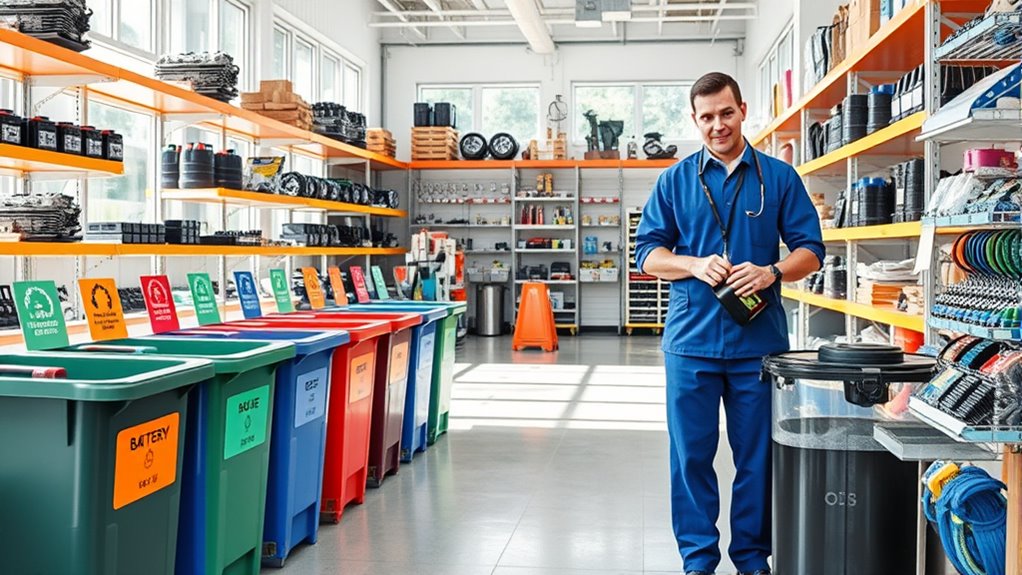Auto parts stores and retailers offer convenient recycling programs for automotive batteries and fluids. You can drop off used lead-acid batteries, motor oil, antifreeze, and other fluids at designated bins, ensuring proper disposal and environmental safety. These programs partner with recycling centers to process materials responsibly. Participating helps protect your community and reduces pollution. To discover how these initiatives work and how you can easily contribute, keep exploring the options available to you.
Key Takeaways
- Auto parts stores provide designated drop-off bins for recycling car batteries, including lead-acid types.
- Stores accept used motor oil and automotive fluids like antifreeze and brake fluid for safe recycling.
- Recycling programs prevent environmental contamination by ensuring proper disposal of hazardous automotive materials.
- Partnerships with recycling centers and agencies ensure materials are processed sustainably and in compliance with regulations.
- Participating in these programs promotes environmental responsibility, reduces waste, and supports community health.

Many auto parts stores now offer recycling programs to help you dispose of used batteries, oil, and other automotive materials responsibly. These programs are designed to make it easier for you to manage hazardous waste safely, reducing environmental impact and encouraging sustainable practices. When it comes to battery disposal, stores often have designated drop-off bins specifically for car batteries, including lead-acid and other types. Instead of throwing a dead battery in the trash, you can bring it directly to the store, where it will be handled according to environmental regulations. Proper battery disposal prevents harmful chemicals like lead and acid from contaminating soil and water sources, safeguarding your community’s health.
Many auto parts stores offer responsible recycling for used batteries, protecting health and the environment.
Oil recycling is just as straightforward. Many auto parts stores accept used motor oil, which is a common byproduct of vehicle maintenance. Instead of pouring old oil down the drain or onto the ground, you can bring it to the store for proper recycling. This not only keeps harmful substances out of local waterways but also allows the oil to be processed and reused, conserving resources and reducing the need for new oil production. Some stores even offer free oil recycling services for small quantities, making it a convenient option for DIY car owners. When you participate in oil recycling programs, you’re contributing to a circular economy where materials are reused rather than discarded.
Beyond batteries and oil, many stores accept other automotive materials like antifreeze, transmission fluid, and brake fluid. These substances require special handling due to their toxicity, and recycling programs ensure they’re managed safely. You’ll often find clear signage and designated areas to drop off these items, so you know exactly where to go. Participating in these programs is simple and highly impactful, as improper disposal can lead to environmental pollution and health hazards. Utilizing recycling programs helps ensure these hazardous materials are processed correctly and reduces the risk of environmental contamination.
Some auto parts stores also collaborate with local recycling centers or waste management agencies to ensure the materials you drop off are processed correctly. This partnership streamlines the recycling process and guarantees compliance with environmental standards. As a vehicle owner, your role is crucial—by choosing to recycle your automotive waste properly, you actively help reduce landfill waste, prevent pollution, and promote a cleaner environment. Recycling automotive materials isn’t just about convenience; it’s about taking responsibility and making a positive difference every time you service your vehicle.
Frequently Asked Questions
Are There Fees for Participating in Auto Parts Recycling Programs?
Generally, auto parts recycling programs don’t charge you fees. The fee structure is often designed to cover program costs or disposal fees, but many stores offer free recycling for certain parts like batteries or oil. Always check with your local retailer, as some may have specific policies or require a small fee for particular items or services. You can usually recycle without worrying about high costs or unexpected fees.
What Types of Auto Parts Are Accepted for Recycling?
Think of your auto parts as the heart of your vehicle’s story, deserving a second chance. You can recycle metal components like engines and exhausts, along with plastic parts such as bumpers and interior panels. By participating, you give these remnants of your journey new life, reducing waste and environmental harm. So, gather your recyclable parts and help turn yesterday’s vehicle into tomorrow’s hope for a cleaner planet.
How Do I Find Local Auto Parts Recycling Locations?
To find local auto parts recycling locations, start by searching online for auto parts collection or recycling drop off centers in your area. Many auto parts stores and retailers have dedicated recycling programs, so check their websites or give them a call. You can also visit local environmental agencies or recycling centers for information. These resources help you easily locate nearby centers where you can responsibly recycle your auto parts.
Are There Any Restrictions on the Quantity of Parts I Can Recycle?
You can usually recycle auto parts without worrying about strict quantity limits, but recycling restrictions may vary by location. Some places might have restrictions on the amount or type of parts you can recycle at once, especially for hazardous materials like batteries or fluids. It’s best to check with your local recycling center or auto parts store to understand their specific policies and avoid any issues when recycling larger quantities.
What Happens to the Recycled Auto Parts Afterward?
After recycling auto parts, they go through an eco-friendly disposal process where valuable materials like metals and plastics are separated and repurposed. You can be confident that these parts are transformed into new products or raw materials, reducing waste and environmental impact. The recycling process guarantees that hazardous substances are safely handled, making auto parts recycling an essential step in sustainable auto industry practices.
Conclusion
By embracing recycling programs at auto parts stores and retailers, you become a crucial part of the green cycle. Every bottle, battery, and oil drum you recycle fuels a cleaner future, like leaves nourishing the earth’s roots. Your small act sparks a ripple effect, turning waste into worth. So, take the step—your commitment can transform the landscape, making sustainability a steady drumbeat in the symphony of eco-conscious living.










